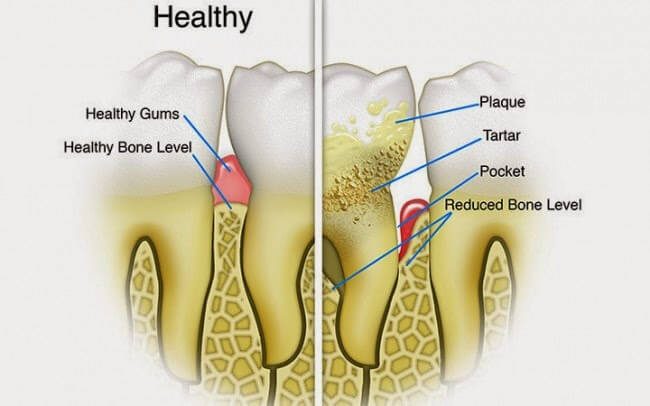In our busy lives, it is important that we take time daily to care for our oral health. A number of unwanted conditions and illnesses could potentially arise if we do not make an effort to keep our mouths healthy and clean. One of the most common issues people who do not properly care for their teeth experience is a build-up of tartar, and it only takes but a day of neglecting to brush your teeth for it to begin to accumulate in your mouth. Below you will find an explanation of what tartar is, as well as what steps you can take to help stop tartar from building up.
What is Tartar?
Tartar begins as plaque, is a sticky substance that is generated from a mixture of saliva and leftover food pieces in your mouth. If you neglect to brush your teeth the right way after eating meals, it begins to form and then to build up on your teeth. This is obviously not good. Plaque contains bacteria, which can contribute to both gum disease and tooth decay.
Furthermore, dental plaque that stays on teeth for a few days becomes hard and turns into what is known as tartar. Tartar can only be removed by scraping it off of your teeth. Tartar contributes to the yellowing of your teeth and an unpleasant odor; therefore, it may be tough to get your mouth fully clean after tartar has built up on your teeth.
How Do Tartar and Plaque Form?
Plaque forms due to chemical reactions in the mouth. To create plaque, the mouth needs bacteria, food particles, carbohydrates and saliva. Most foods, even healthy choices like vegetables and fruits contain carbohydrates. Foods that have high sugar levels have more carbohydrates in them, so eating a lot of sweets means you are at a greater risk of plaque formation.
The first step of the formation of plaque happens when you break down food into carbohydrates while chewing. These carbohydrates combine with the natural bacteria in the mouth and create an acid which can eat away at enamel.
When this acid combines with leftover food particles and saliva, yet another chemical reaction occurs and the substance becomes sticky and hard. This new substance is called plaque, which turns into tartar if not treated properly.
How Does Tartar Affect Teeth and Gums?
Tartar makes it difficult to floss and brush your teeth like you need to. Improper care leads to cavities and tooth decay. Tartar forming above the gumline means the bacteria within it can irritate and damage the gums. If this remains over time, it could cause progressive gum disease.
This disease can easily progress into periodontitis when little pockets form between the tooth and the gum and become bacteria-infected. The results of this can damage the tissues and bones that hold your teeth in place. Some studies even say bacteria from gum disease can contribute to heart disease and other ailments of the body.
What Can I Do to Prevent Tartar?
- Regular brushing. Dentists recommend brushing your teeth twice a day for a minimum of two minutes each time. A quick 30-second brush won’t do the job. Use a soft-bristle brush that is small enough to fit comfortably into your mouth, and reach all surfaces of your teeth including your rear molars.
- Use an electronic toothbrush. Studies have shown that they may get rid of plaque more efficiently than manual ones. Either way, whatever you choose, make sure it has the American Dental Association (ADA) seal of approval. These brushes have had to go through extensive tests and quality control before getting that seal.
- Use tartar control toothpaste with fluoride. Fluoride can help repair damage to the enamel, and some products even have something called triclosan that helps fight bacteria in plaque.
- Floss. Even with the most thorough of brushing, dental floss is the only way to get rid of plaque between the teeth and prevent tartar from forming in hard to reach places. If you wear braces, learn how to floss with braces.
- Rinse daily with antiseptic mouthwash to get rid of plaque-causing bacteria.
- Be mindful of your diet. Bacteria in the mouth lives off of starchy and sugary foods. When these two factors come together, they generate harmful acids. Eat a healthy diet and limit sugar. If you do eat sugar, brush afterwards and drink plenty of water.
- Quit smoking. Studies show that those who smoke or use tobacco products have a greater risk of tartar formation.
Conclusion
Plaque is a nasty thing caused by a mixture of food, saliva and bacteria that can quickly build up unto tartar. Tartar is a hardened substance that is responsible for gum diseases and must be scraped off by a dentist or dental hygienist when it forms.
To prevent the formation of plaque and tartar, do things like thorough brushing and flossing twice a day. You can also use an electronic toothbrush, watch your diet and try to quit smoking. All of these things will send you on your way toward a healthier mouth in no time.
Have you ever had to get tartar scraped off? What is your best tip for removing plaque? Let us know in the comments!


Leave a Comment